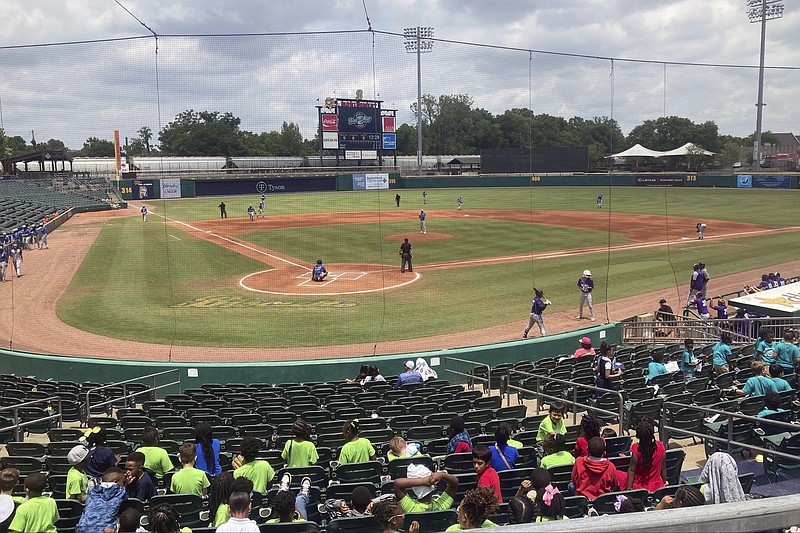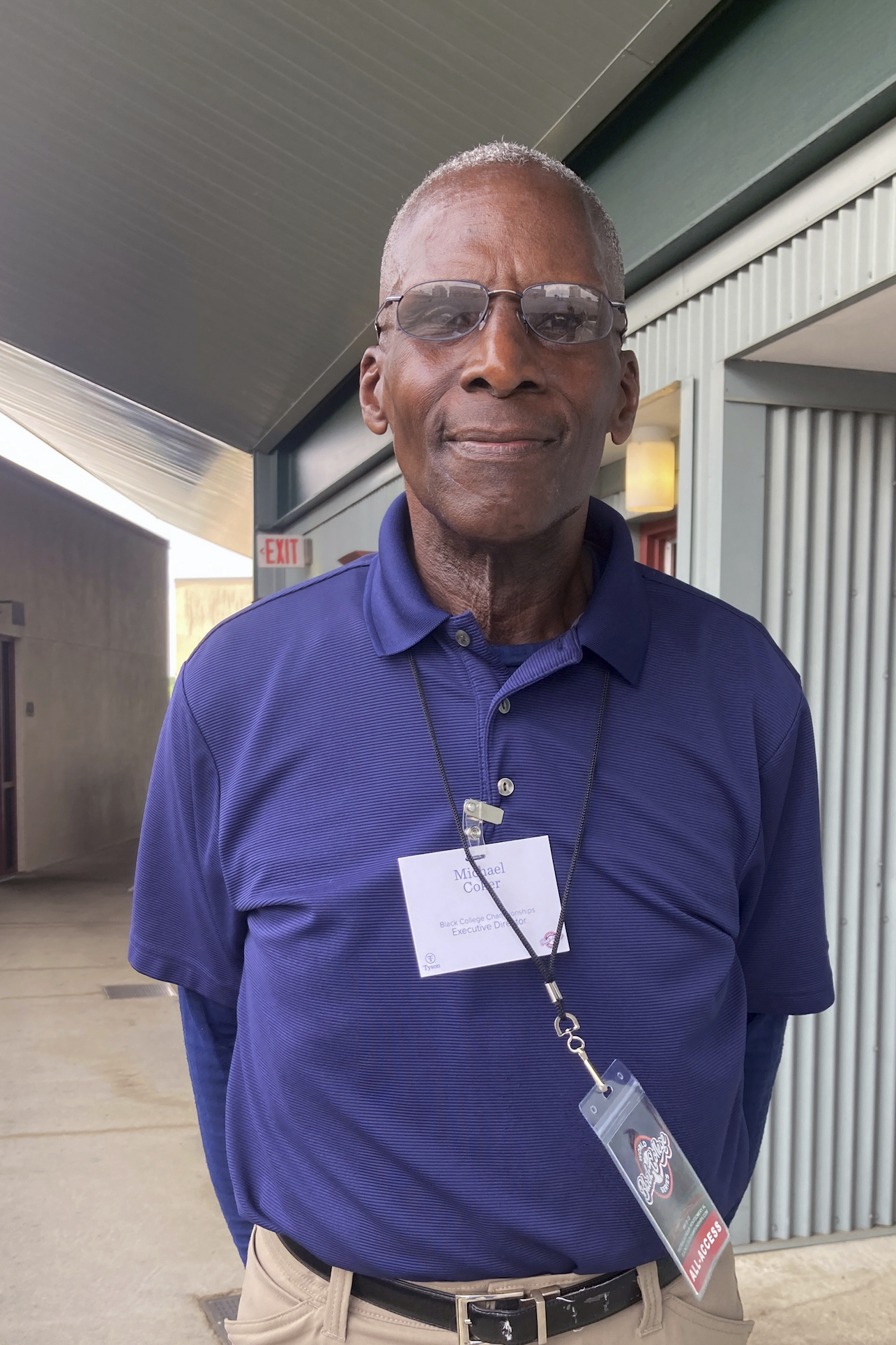MONTGOMERY, Ala. -- The spectators were mostly Black kids, ranging from elementary school to high school. The teams -- all from historically Black colleges and universities -- had names that won't resonate with the average baseball fan.
Wiley College. Bluefield State. Rust College.
The Black College World Series, held this week in Montgomery, is giving dozens of HBCU players from NAIA and Division II schools a chance to compete for a title beyond their own leagues and perhaps attract attention from Major League Baseball teams.
Not a single one of their HBCU predecessors was on an MLB opening day roster this year, despite a rich history of big league alums that includes Hall of Famers Lou Brock (Southern University), Andre Dawson (Florida A&M) and Larry Doby (Virginia Union)
"We all have concerns about the fact that we don't have as many African-American players playing today," Hall of Fame shortstop Ozzie Smith said. "But it's all about what do you do about it? I think it's going to take the work of all of us."
HBCU athletics have taken on a higher profile recently in sports ranging from football and basketball to gymnastics and wrestling. But their role as a pro pipeline has been scrutinized.
The Black College World Series hopes to change that for baseball, and now it has support from MLB, one of several efforts by the league to boost participation among Black kids.
Only 59 of the 945 players (6.2%) on opening day rosters this season were Black players born in the U.S. That's a nearly two-thirds decline from when the Institute for Diversity and Ethics in Sports started compiling Racial and Gender Report Card data in 1991. Back then, it was 18%.
There were no U.S.-born Black players in last year's World Series for the first time since 1950, not long after Jackie Robinson broke the MLB color barrier.
It's a far cry from when Smith was starring for the St. Louis Cardinals starting in the early 1980s. Smith said it's a trend that concerns current players and his contemporaries alike.
The process of addressing that issue, to him, starts with getting minor league baseball opportunities for one player at a time, not expecting wholesale increases overnight. Over the long term, it's also about generating interest and chances for kids like the thousands brought out to watch the Black College World Series games.
Only 8.4% of Black children aged 6-12 played baseball regularly, according to a 2020 report from the Sports & Fitness Industry Association.
Smith, who did not attend an HBCU, thinks part of the decline is kids seeing players having more rapid success in the NBA and NFL, instead of having to climb through the minor leagues. That includes high school phenoms-to-NBA stars like LeBron James and the late Kobe Bryant.
"Baseball probably will give you more longevity than some of the other sports, but because it's not that instantaneous success in making to the big leagues, I think, is what holds them back a little bit," Smith said. "If a kid can play football or he can play basketball, they look at that as a quicker avenue to stardom."
LaMonte Wade, the only Black player on the San Francisco Giants, said events like the Black College World Series are a great first step.
"Anytime that you can promote Black players playing the game, and that's what it sounds like they're trying to do, I feel it will bring more attention," Wade said before Thursday's game at Arizona. "Representation is down, therefore not too many African-Americans are following the sport.
"Once you get into high school you kind of have to pick what sport you want to play," he added. "Most African-Americans choose basketball or football. That's mostly where our friends are playing, but if we can start them at a young age I think we can get the numbers up."
Cleveland Guardians slugger Josh Bell sees other barriers to Black participation.
"Fifty years ago, baseball was played in cul-de-sacs and streets and parks and now it's a lot more kids are inside and baseball is more about taking your kid to private lessons and who has the best bat and who is on the best team," Bell said.
"If things want to be done about it you've got to bring it back to this generation and what it's going take to advance it," he added.
Michael Coker, a former baseball player at Edward Waters College, started the Black College World Series in 2021. In May, MLB signed on to help support an event sponsored by Tyson Foods, which brought in some 10,000 youths from Montgomery and surrounding areas, according to company spokesman Derek Burleson.
"What's really important for young kids is to see people that look like them," said Jean Batrus, executive director of the Youth Development Foundation, a collective effort by MLB and the MLB Players Association. "And you're more willing to play a game if you see a Black, African-American coach, you see other kids playing."
Coker said none of the players have been drafted from the first two Black College World Series, though a handful of scouts have come out. The event, which concludes Saturday, includes Albany State, Savannah State, Bluefield State, Edward Waters, Miles College, Talladega College, Rust College, Wiley College and Paine College.
It's not the only event geared toward increasing exposure for players from historically Black schools. The inaugural HBCU Swingman Classic will feature 50 HBCU players in July during MLB All-Star Week at the Seattle Mariners ballpark with Hall of Famer Ken Griffey Jr. helping to assemble the roster. MLB's Reviving Baseball in Inner Cities (RBI) program has also produced several Black big leaguers, including CC Sabathia and J.P. Crawford.
Four of the top five players selected in last summer's MLB amateur draft are Black, and all were alumni of MLB's Dream Series, a showcase event predominantly targeting Black players.
Pittsburgh Pirates outfielder Andrew McCutchen said the answer is clear-cut for improving HBCUs' athletic prospects. It comes down to money. McCutchen cited current Colorado coach Deion Sanders' efforts at Jackson State in football, where he coached previously.
"There's only one answer, and we all know the answer to, and it's the elephant in the room: funding," McCutchen said. "That's what every single college, and especially HBCUs, need. To be able to give their team the exposure that they feel like their players deserve, and to get that treatment that other divisions are able to get. It's funding."
Montgomery resident Corey Cortner also said that representation, even at the BCWS level, was critical. Cortner helped helped chaperone the class of his son, who plays youth baseball, to watch Wiley and Rust on Friday. To him, "it's a great event" getting college players exposure and even a chance to enjoy having kids ask for autographs.
"Overall, we need to try to increase participation in minorities in baseball and this is a great way to get that going," said the 50-year-old Cortner, who is Black. "It gives them an opportunity to see people that look like themselves playing on the big stage.
"Just seeing yourself in someone else ... is a great motivation for all kids. That goes beyond race. That shouldn't be just a Black thing."


